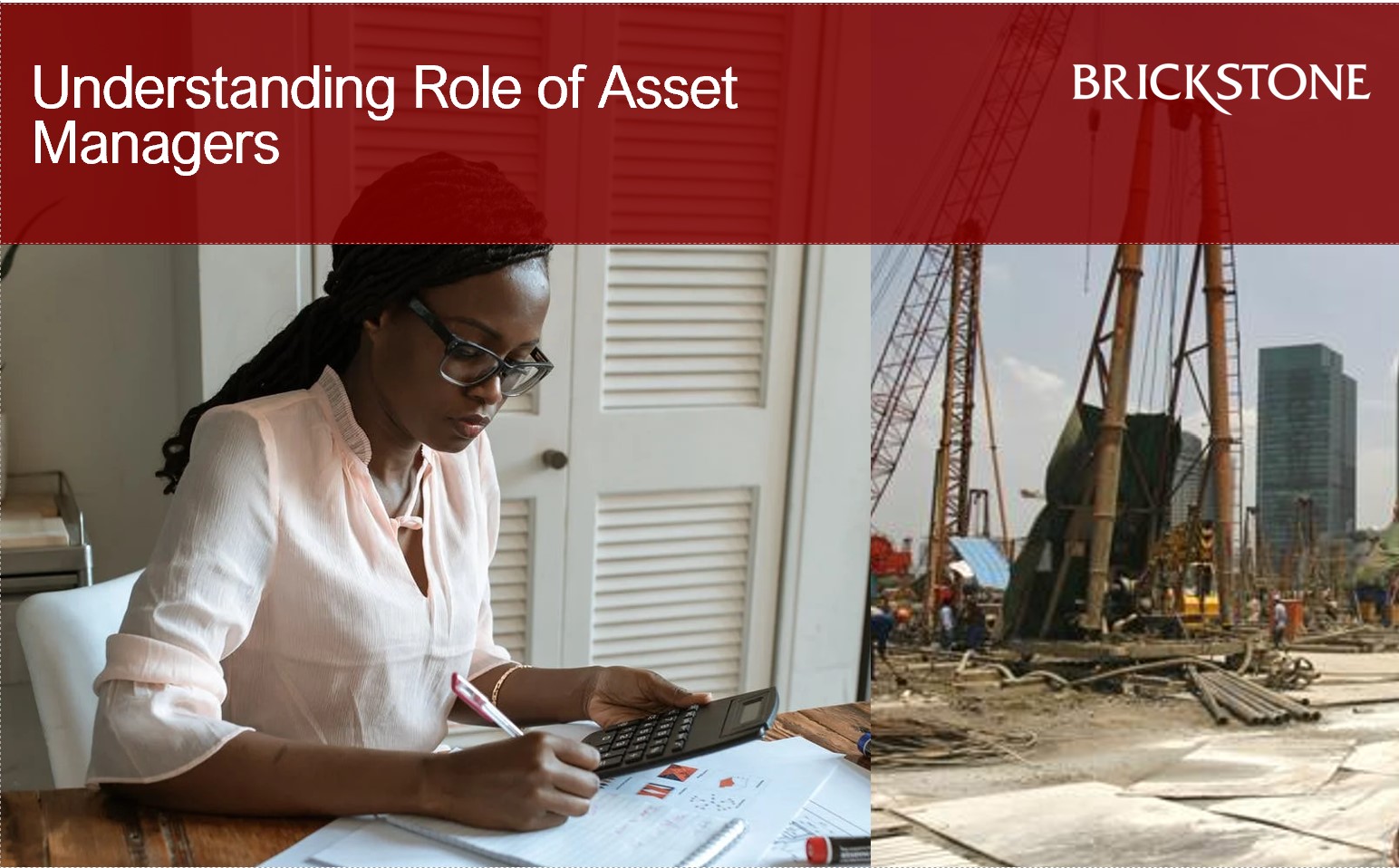Understanding the Role of Asset Managers
Role of Asset Managers
The role of asset managers has evolved over the years, as real estate has also evolved from individual to institutional ownership and from the management of a few properties in a single market to large portfolios located in often dispersed geographical areas.
The Modern Asset Manager
Asset management can be defined as the process of making the best use of an organization’s assets in order to maximize shareholder value and to provide the best possible returns to the other stakeholders in the organization.
The Institute of Real Estate Management (IREM) defines Asset Management as a system that directs and measures the performance of asset groups (in this case, real estate assets) and produces a flow of information needed by ownership to make investment decisions.
The modern real estate manager is a multi-disciplined, highly trained real estate professional who is expected to not only be responsible for managing investment assets during the investment holding period but be an integral part of both the acquisition and disposition process.
The professionalism of today’s asset manager reflects the higher fiduciary standards required to manage real estate investment programs in today’s litigious business environment. The major role of asset managers is to ensure the overall success of the building during the holding period. Since the manager is generally not on site, however, many of the day-to-day duties are delegated to an experienced property manager, often an employee of a third-party service provider.
Allocation of Managerial Responsibilities (ASSET VERSUS PROPERTY MANAGER)
Policy approves plan
| Asset Manager | Property Manager | |
|---|---|---|
| Annual Plan | Prepares | Building input |
| Diversification risks | Monitors | Building input |
| Tenant Relations | Primary responsibility | Day-to-Day Contact |
| Insurance | Analyses negotiates | Local contact |
| Building Operations | ||
| Custodial | Approves contractor(s) | Manages contractor(s) |
| Maintenance | Approves contractor(s) | Manages contractor(s) |
| Procurement | Approves supplier | Manages suppliers and inventory(S) |
| Leasing | Negotiates leases | New tenant Moves in |
| Project Management | ||
| Space Build outs | Approves design budget and contractor(s) | Coordinates construction |
| Space Remodeling | Approves design budget and contractor(s) | Coordinates construction |
| Building Repairs | Approves budget | Executes (internally or externally) |
| Security | Policy approves plan | Executes |
| Disaster Management | Execute | |
| Financial Reporting | Coordinates with Accounting; approve; analyses | Inputs |
| Investor Relations | Participates if requested | Local tours |
Asset Manager Responsibilities
While property management is a vital function at the heart of a successful real estate investment program, it is only one of the role asset managers in real estate, which usually include the following function.
Tenant Relations
The asset manager’s most critical responsibility is maintaining a sound relationship with the tenants. This is one of the major changes in Asset management over the years. The view of the tenant has been evolved from the tenant (legal term) to the customer (business term). It represents a change in attitude on the part of the industry toward recognizing the tenant as the true source of income for the property and the key to the ultimate success of an investment.
This makes good sense because real estate is the ‘residual’ of other business activities. If the building is not serving the specific needs of the customer, ultimately the tenant will be lost to competing buildings.
There also can be an adverse rippling effect. Assuming the tenant is a major regional or national corporation in which the leasing approval process is centralized, a negative experience with the property owner with one property can adversely affect decisions regarding other buildings owned or managed by the same firm.
The consolidation of ownership in the real estate industry has placed greater emphasis on building strong brand loyalty, which can often make a difference in tenant retention, particularly during economic downturns.
In essence, building and maintaining tenant relations is a key role of asset managers in real estate.
Business Plan
An important part of the asset management process is the development and periodic review of a business plan. The review is done for each property in the investment portfolio.
The business plan describes where the property stands in terms of the original investment underwriting. It also covers the actions that will be taken by the asset and property manager during the coming period to enhance and position the property in the marketplace.
In developing the business plan, the role of asset managers is to review and may revise the original pro forma cash flow analysis. The asset manager does this to take into consideration recent events as well as new management initiatives that should be undertaken in the coming year.
Utilizing the assumptions of the cash flow analysis, the asset manager develops a current estimate of the value of the property derived from the DCF analysis, based on the property’s revised business plan.
The discount factor utilized in the analysis is typically the investor’s target return. Alternatively, in the case of investment Partnerships, the return stated in the original partnership agreement
Insurance
A major role of asset managers is to periodically insure properties in the portfolio. The asset manager takes the following into consideration:
- Property risks specific to a geographical area, property type, building location, age, soil conditions, and type of construction
- Insurance carried by major clients, particularly if a single-tenant building
- Liability risks specific to the property such as tenant mix, building materials used in pedestrian areas, parking lots design, traffic flow and the use of nearby properties
- Major man-made or natural features adjacent to or near the property such as airports, freeways, stadium, waterways, forests e.t.c.
- Special insurance requirements by clients, lenders, local government jurisdictions e.t.c
It is generally wise to rebid insurance policies every year or two. This is done in order to obtain the best possible rate for the coverage required.
Project Management
Project management is also a core role of asset managers. They are usually responsible for procuring and managing construction activities. These activities may include building repairs and improvements and customer space build-outs.
At a minimum, the asset manager should remain abreast of progress on these activities in order to answer tenant and management questions regarding issues such as the scope of the project, its current status, and the anticipated completion date.
Financial Reporting
Another role of asset managers is financing report. They work closely with internal and external accountants in preparing periodic financial reports for investors. Asset managers may be asked to prepare specialized reports on assets within their management from time to time.
Investor Relations
Building and nurturing investor relations is also a role of Asset managers as they may also be asked to participate in meetings with existing investors or marketing presentations to prospective investors.
Decisions made during the holding period will influence the investors’ financial return and their satisfaction with the managers’ performance. Hence, it isn’t surprising that good asset managers are becoming the most sought after and well-compensated of all investment professionals.






